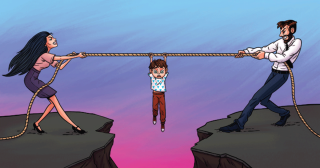14 Outdated Parenting Tips Modern Moms Had Better Ignore
14 Outdated Parenting Tips Modern Moms Had Better Ignore
Parenting advice has evolved significantly over the years, with new research and insights challenging many traditional beliefs. While some old-school parenting tips were well-intentioned, they may no longer be suitable for today’s children. Here are 14 outdated parenting tips that modern moms would be better off ignoring.
1. “Let Babies Cry It Out”
The Outdated Tip:
Parents were once advised to let babies cry themselves to sleep to teach independence and self-soothing skills.
Why It’s Outdated:
Modern research suggests that responding to a baby’s cries fosters trust and emotional security. Ignoring their distress can cause anxiety and attachment issues later on.
The Modern Approach:
Use a balanced method, like responsive comforting or the Ferber method, which teaches self-soothing while offering emotional support.
2. “Spanking Teaches Discipline”
The Outdated Tip:
Physical punishment, like spanking, was seen as an effective way to discipline children and teach them right from wrong.
Why It’s Outdated:
Studies show that spanking can lead to increased aggression, emotional issues, and a strained parent-child relationship. It doesn’t address the underlying cause of misbehavior.
The Modern Approach:
Use positive discipline techniques like time-outs, natural consequences, and setting clear boundaries to teach respect and self-control.
3. “Boys Will Be Boys”
The Outdated Tip:
This phrase was often used to excuse aggressive or rough behavior in boys, suggesting that such actions were natural and should be overlooked.
Why It’s Outdated:
It reinforces harmful gender stereotypes and discourages boys from learning empathy, emotional regulation, and responsibility for their actions.
The Modern Approach:
Encourage both boys and girls to express their emotions, respect others, and be accountable for their actions, regardless of gender.
4. “You Shouldn’t Hold Your Baby Too Much”
The Outdated Tip:
Parents were warned that holding or carrying their baby too much would “spoil” them, making them overly dependent.
Why It’s Outdated:
Holding and cuddling babies is crucial for their emotional development, creating strong bonds and a sense of security. Babies who feel secure are more likely to grow into confident, independent children.
The Modern Approach:
Respond to your baby’s needs by offering comfort and physical closeness without worrying about “spoiling” them.
5. “Finish Everything on Your Plate”
The Outdated Tip:
Parents often enforced the rule that kids should finish all the food on their plate, regardless of whether they were full.
Why It’s Outdated:
Forcing children to eat when they’re not hungry can lead to unhealthy eating habits, overeating, and a poor relationship with food.
The Modern Approach:
Encourage mindful eating by allowing kids to listen to their hunger cues. Serve smaller portions and let them ask for more if they’re still hungry.
6. “Children Should Be Seen and Not Heard”
The Outdated Tip:
This old adage emphasized that children should be quiet, obedient, and not voice their thoughts or feelings.
Why It’s Outdated:
Silencing children’s voices can stifle their confidence and communication skills, making them feel unimportant or dismissed.
The Modern Approach:
Encourage open communication, where children feel safe expressing their opinions, emotions, and needs. It fosters confidence and emotional intelligence.
7. “Use Sugar to Calm Them Down”
The Outdated Tip:
Some older parenting tips suggested using sugar, such as candy or sweets, to comfort or calm upset children.
Why It’s Outdated:
Sugar can lead to hyperactivity, mood swings, and unhealthy eating habits. It also creates an association between emotions and food, which can contribute to emotional eating later in life.
The Modern Approach:
Teach healthy ways to cope with emotions, like talking, breathing exercises, or creative outlets, instead of relying on food as comfort.
8. “Don’t Talk About Feelings”
The Outdated Tip:
There was once a belief that discussing emotions would make children overly sensitive or weak, especially in boys.
Why It’s Outdated:
Suppressing emotions can lead to emotional issues, such as anxiety, depression, or difficulty forming healthy relationships. Emotional intelligence is key to personal well-being.
The Modern Approach:
Encourage children to talk about their feelings, validate their emotions, and teach them healthy coping mechanisms.
9. “Early Potty Training Is a Must”
The Outdated Tip:
Parents were once encouraged to potty train their children as early as possible, often before they were developmentally ready.
Why It’s Outdated:
Forcing potty training too soon can lead to frustration, anxiety, and setbacks. Every child develops at their own pace, and readiness is key.
The Modern Approach:
Wait for signs of readiness before starting potty training, such as showing interest in the toilet or staying dry for longer periods.
10. “Strict Schedules for Feeding and Sleeping”
The Outdated Tip:
Older parenting books often advocated for strict feeding and sleeping schedules, believing that this would instill discipline in babies.
Why It’s Outdated:
Rigid schedules can ignore the baby’s natural hunger and sleep cues, leading to stress for both the baby and parents. Babies need flexibility based on their developmental needs.
The Modern Approach:
Follow a baby-led approach, where you pay attention to their hunger and sleep signals. Flexible routines help babies adjust naturally without feeling forced.
11. “Don’t Let Them Play in the Dirt”
The Outdated Tip:
Parents were once advised to keep their children as clean as possible and prevent them from playing in the dirt to avoid germs.
Why It’s Outdated:
Playing in nature, including the dirt, exposes kids to healthy bacteria that can help build a stronger immune system and enhance physical and mental development.
The Modern Approach:
Encourage outdoor play and exploration while teaching proper hygiene practices like hand-washing after playtime.
12. “A Good Parent Does It All Alone”
The Outdated Tip:
There was once a belief that good parents should handle everything themselves without relying on help from friends, family, or caregivers.
Why It’s Outdated:
Parenting is demanding, and the idea of “doing it all alone” can lead to burnout, stress, and feelings of isolation. It takes a village to raise a child, and there’s no shame in asking for help.
The Modern Approach:
Embrace the support of others, whether it’s through family, friends, or a parenting community. Self-care and a strong support system make for healthier parents and happier children.
13. “Gender-Specific Toys Only”
The Outdated Tip:
In the past, boys were encouraged to play with trucks, and girls with dolls, reinforcing strict gender roles through toys.
Why It’s Outdated:
Limiting toys based on gender stifles creativity and can reinforce harmful stereotypes. Children benefit from a variety of toys that encourage different types of play, learning, and development.
The Modern Approach:
Offer a wide range of toys that nurture different skills—regardless of gender. Let children explore their interests freely, whether it’s construction, pretend play, or art.
14. “Boys Don’t Cry”
The Outdated Tip:
It was once commonly said that boys shouldn’t cry because showing emotions was considered a sign of weakness.
Why It’s Outdated:
Suppressing emotions, especially for boys, can lead to emotional detachment, mental health struggles, and difficulty processing feelings in healthy ways.
The Modern Approach:
Encourage all children, regardless of gender, to express their emotions freely. Teach them that crying and talking about feelings are natural and healthy.
Final Thoughts
Parenting evolves with new research, and while some old advice may have worked in the past, modern moms can benefit from updated, evidence-based approaches that support healthy development. By letting go of these outdated tips, parents can focus on nurturing their children’s emotional, mental, and physical well-being with more effective and compassionate methods.










